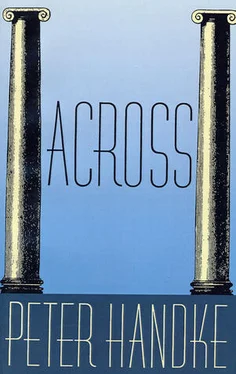Peter Handke - Across
Здесь есть возможность читать онлайн «Peter Handke - Across» весь текст электронной книги совершенно бесплатно (целиком полную версию без сокращений). В некоторых случаях можно слушать аудио, скачать через торрент в формате fb2 и присутствует краткое содержание. Год выпуска: 2000, Издательство: Farrar, Straus and Giroux, Жанр: Современная проза, на английском языке. Описание произведения, (предисловие) а так же отзывы посетителей доступны на портале библиотеки ЛибКат.
- Название:Across
- Автор:
- Издательство:Farrar, Straus and Giroux
- Жанр:
- Год:2000
- ISBN:нет данных
- Рейтинг книги:3 / 5. Голосов: 1
-
Избранное:Добавить в избранное
- Отзывы:
-
Ваша оценка:
- 60
- 1
- 2
- 3
- 4
- 5
Across: краткое содержание, описание и аннотация
Предлагаем к чтению аннотацию, описание, краткое содержание или предисловие (зависит от того, что написал сам автор книги «Across»). Если вы не нашли необходимую информацию о книге — напишите в комментариях, мы постараемся отыскать её.
Across — читать онлайн бесплатно полную книгу (весь текст) целиком
Ниже представлен текст книги, разбитый по страницам. Система сохранения места последней прочитанной страницы, позволяет с удобством читать онлайн бесплатно книгу «Across», без необходимости каждый раз заново искать на чём Вы остановились. Поставьте закладку, и сможете в любой момент перейти на страницу, на которой закончили чтение.
Интервал:
Закладка:
The phone rang fairly often; but it was only someone who had dialed a wrong number — as if Salzburg were the city not only of disorderly pedestrians but also of disorderly telephoners. Finally, after calls for the “parish office,” for a man called Siegfried, for the “customs office for overseas shipments” and Part-Time, Inc., I shouted into the phone: “Shut up!” After that, I stopped answering.
In the morning, my mail fell through the door slot: advertisements, and one solitary letter, consisting of a printed form titled “News Flash,” with a check mark in the margin.
During the day, the sounds from the supermarket provided distraction. When it was closed for lunch hour, I waited almost impatiently for the beep of the cash registers to resume.
Of course, all this could be told in a different way. When I looked in the mirror, there were no eyes. I felt as if I had no body left; that is, I no longer had any share in the light and wind, in the cold or heat; and this was a privation. As I lay there without dignity, I was a painful husk; a husk with nothing inside. In the absence of a viewer, there was nothing left to view. Once, in the dusk, I confused the gigantic Untersberg with a wooded knoll. Another time, I saw a cliff as a flashing guillotine. A volcano had erupted in the Staufen; great gray-violet clouds of smoke drifted from its pyramidal summit; and when again I looked westward, the whole mountain had collapsed into a rubble heap only half its height. (In reality, the main peak was hidden by rain clouds, so only the much smaller front peak could be seen.) And what did “west” mean? The cardinal points had become meaningless, as they do for one cast adrift on the open sea; in the place of direction, confusion reigned. When once I made an attempt to dress, I missed all the openings and stood there like a twisted malefactor (funny, I have to admit). I heard sounds as when the Föhn is blowing; they seemed to come not from my field of vision but from around the corner, so to speak, from behind my back, taking me unawares, without the corresponding visual images. The everyday cries of the jackdaws rang out like bursts of gunfire; I suddenly heard the clip-clop of a horse’s hoofs as though a stopped clock had started (it would stop again in an instant); cocks crowed as though sounding the alarm, or taps. And whenever the bus wires struck together in the woods outside, a crashing and a crackling were heard as when a big building is on fire.
Often there was something to laugh about: once, some horses actually turned up at the bus terminus, hitched to cabs that seemed to have come to this wilderness by mistake. Inside them sat exotic tourists, aiming their cameras without conviction at the Colony. But I didn’t laugh.
Yet I didn’t think there was anything wrong with me. In fact, I felt a strange satisfaction at “exposing” myself, just as there can be a certain satisfaction in exposing oneself to total darkness or a glacial wind — in laying oneself open to the worst sort of adversity. Satisfaction? No, pleasure. Pleasure? No, determination. Determination? No, acquiescence in the conditions of existence.
In all those days, I never once felt anything akin to guilt. What I felt was something worse. I had thrust a long knitting needle so accurately into someone’s heart that there was not so much as a cut to be seen in the outer skin, and everybody was congratulating me over it. But I saw myself from then on as living in — the word cannot be avoided — perdition. (And there were no hands with which to cover the face of him who had seen it; if anyone had shouted “Hands up!” I’d have left them dangling at my side, and not out of contempt for death.) When people come home from work in the evening, don’t they sometimes sigh while settling into a chair: “How good it feels to finally be able to sit down!” But, with me, sitting had the opposite effect. Nothing made me feel good. Only perhaps I should avoid the word “perdition” and say instead: “The bouncing bird, the cat washing itself, were lacking in the center of my field of vision.” In the center there was nothing, neither a playing dog nor a swaying daddy longlegs (or, if there was, it fled instantly). Or there was something in the center, but nothing pleasant. Once a freshly shot pair of chamois were hanging in the open garage of a villa, still dripping blood, hanging by their horns from two hooks, face to face. Even a bird and a cat appeared, but they were corpses drifting in the canal. Or the center was a place of staggering illusions: the light-colored logs lying crosswise at the end of the meadow looked like a dead ox; a seesawing brimstone butterfly appeared to me repeatedly as a scrap of yellowish paper. Or the center was a place of disillusionment; when I looked for it, it was hidden by billboards or by exotic shrubs with their unreal colors. Or the center itself was falsified: the house next door, raised by an artificially filled-in terrace, had a bell tower on the ridge of its roof in the manner of old farmhouses — but the area below the terrace seemed eroded, the shrine over the door of the house meant only: “You are not welcome here”—and the little bell tower, taken as a center, framed a mere hole: because the bell belonging to it, or the clapper, or the bellpull, was missing. By day, this hole often suggested a whirl of clotted milk, and by night, at best, an artificial satellite broadcasting the latest news of wars and disasters. The worst of these falsifications in those days were the so-called natural centers, occupied by the church towers, at least one of which “naturally” catches the eye at every turn of the head. Not only did these steeples, whether bulbiform, conical, or cylindrical, strike me as pretentious; I also regarded them as petrified delusions, making a mockery of our — all men’s — forlornness. Nobody needed them, but they set themselves up as friends in need. Even in misery, didn’t the horizon sometimes send us light and air, which wanted to be let in and seen? And these steeples cut off the view.
What I missed this particular Holy Week was the usual ringing of the bells. I hungered for it. It seemed inconceivable to me that a thinker some decades ago should have praised the big cities of the Communist world on the ground that the “deadly sad Western ringing of bells had been done away with.” The bells were silent. I was not content with the whistling of the wind. Nor with the roaring of the canal down at the rapids. Nor with the monotonously musical electrical purring of the approaching buses. I was reminded of a passage in a writer,of the last century who praised the Roman poet Lucretius, saying that for him the “black pit was infinity itself,” and that his era, extending from Cicero to Marcus Aurelius, represented a moment unique in history, “when the gods were dead and Christ had not yet been born, when man alone existed.” During the days when the bells were silent and the wind whistled and the buses purred, or so at least it seemed to me later on, I relived that era.
Yet my experience was rather different from that of the poet Lucretius, allegedly so heroic in his godlessness. It seemed to me as obvious as it was unthinkable that I alone, a human being with death as his goal, existed. Something was lacking, but not Christ and not the gods, and not the immortal soul, but something physical: a sensory organ, the crucial one, without which the whistling of the wind and the purring of the buses remain incomplete.
Often in the past, glancing at a distant mountain ridge, I had seen a procession of climbers without beginning or end, and thought in spite of myself of the famous trek to the gold fields; and in this procession, I, the viewer, was a dark, heavily laden figure among others. However often I looked, that gently rising line, broken by the tops of spruce trees, was uninhabited, orphaned. The lines up and down the pass yielded no human pyramid. How can I give a more accurate picture of the sense that I lacked? Perhaps only Greek has a verb expressing that fusion of perception and imagination (which is essential). On the surface, this verb means only “to notice”; but it carries overtones of “white,” “bright,” “radiance,” “glitter,” “shimmer.” Within me there was an outright longing for this radiance, which is more than any sort of viewing. I shall always long for that kind of seeing, which in Greek is called leukein .
Читать дальшеИнтервал:
Закладка:
Похожие книги на «Across»
Представляем Вашему вниманию похожие книги на «Across» списком для выбора. Мы отобрали схожую по названию и смыслу литературу в надежде предоставить читателям больше вариантов отыскать новые, интересные, ещё непрочитанные произведения.
Обсуждение, отзывы о книге «Across» и просто собственные мнения читателей. Оставьте ваши комментарии, напишите, что Вы думаете о произведении, его смысле или главных героях. Укажите что конкретно понравилось, а что нет, и почему Вы так считаете.












